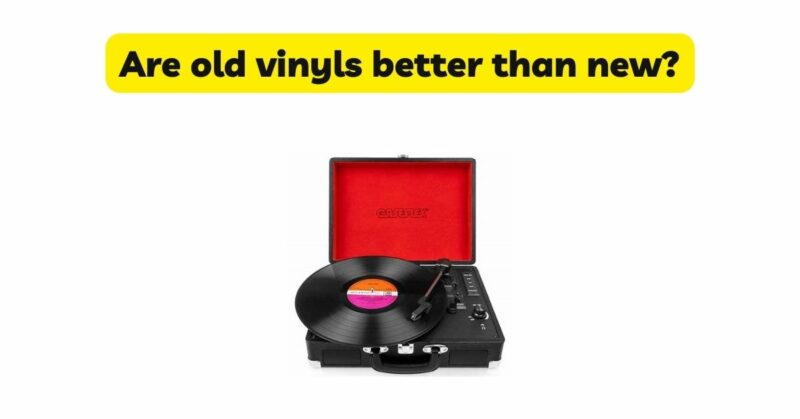Vinyl records have seen a resurgence in popularity, captivating music enthusiasts with their unique sound and tactile experience. As collectors dive into the world of vinyl, a common question arises: Are old vinyl records superior to new ones? Some argue that older records possess a certain charm and superior sound quality due to factors like manufacturing techniques and analog mastering. In this article, we will explore the notion that old vinyl records are inherently better, examining the variables that affect sound quality, the evolution of vinyl manufacturing, and the subjective nature of audio perception.
I. Sound Quality Factors:
When discussing the sound quality of vinyl records, it is crucial to consider the variables that impact the listening experience:
- Mastering and Production Techniques:
- Analog vs. Digital Mastering: The mastering process, regardless of the record’s age, plays a significant role in sound quality. Both analog and digital mastering techniques can result in excellent audio fidelity, and advancements in digital technology have made it possible to achieve high-quality mastering.
- Vinyl Manufacturing:
- Pressing Techniques: The quality of vinyl records depends on the manufacturing process, including factors such as the quality of vinyl used, stamper condition, and pressing plant standards. Modern manufacturing techniques have improved, ensuring higher quality control and consistency.
- Condition and Care:
- Wear and Tear: The condition of a record, regardless of its age, affects sound quality. Well-preserved old records and properly cared-for new records can both provide excellent audio fidelity.
- Cleaning and Maintenance: Regular cleaning and proper maintenance are crucial for preserving and maximizing the sound quality of vinyl records, regardless of their age.
II. Evolution of Vinyl Manufacturing:
Vinyl record production has evolved significantly over the years, leading to improvements in quality control and consistency. It is essential to understand the advancements in manufacturing techniques to dispel the belief that old vinyl records are inherently better:
- Quality Control:
- Modern Standards: Vinyl manufacturing plants today have stringent quality control measures in place to ensure consistency and minimize defects.
- Improved Materials: Advances in vinyl formulations and pressing techniques have resulted in records that are more resistant to warping and have less surface noise.
- Analog vs. Digital Workflow:
- Analog to Digital Transition: The transition from analog recording and mastering to digital workflows has occurred over time. However, it is important to note that the choice of using analog or digital equipment during the recording and mastering process does not necessarily dictate the quality of the final product.
III. Subjectivity of Sound Perception:
The perception of sound quality is subjective and varies from person to person. Factors such as personal preferences, playback equipment, listening environment, and individual hearing capabilities can influence how someone perceives the sound quality of vinyl records. Some individuals may prefer the nostalgic and warm sound associated with older records, while others may appreciate the precision and clarity of modern pressings.
IV. Preservation and Care:
Regardless of whether a vinyl record is old or new, proper preservation and care are crucial for maintaining sound quality and ensuring longevity. Here are some tips for preserving vinyl records:
- Store records upright in a cool, dry place away from direct sunlight.
- Use protective inner and outer sleeves to prevent scratches and dust accumulation.
- Clean records regularly using proper cleaning methods and tools.
V. Conclusion:
In conclusion, the belief that old vinyl records are inherently better than new ones is a subjective notion that can vary from person to person. While older records may possess a nostalgic charm, advances in vinyl manufacturing and quality control have resulted in high-quality new pressings. Ultimately, the sound quality of a vinyl record is influenced by multiple factors, including mastering techniques, manufacturing standards, and individual listening preferences. By focusing on proper preservation and care, vinyl enthusiasts can appreciate the unique qualities and experience that vinyl records offer, regardless of their age.


